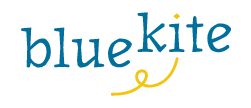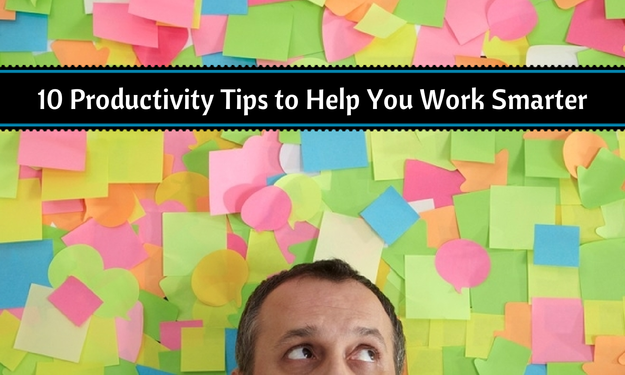A couple of weeks ago, I was meeting with Danielle, one of our team members. During the course of the conversation, we got on the topic of productivity and how to be more efficient with our time.
I’m far from a productivity expert. But, as a business owner, I’m constantly looking for ways to work smarter to make the most of my time.
When talking to Danielle, I shared a number of things that work well for me and I thought our community here could benefit from these ideas as well.
After all, who doesn’t want to be more productive?
Top Productivity Tips
So, without further adieu, here are some of my favorite productivity tips to help you work smarter, not harder.
1. Use Timers.
Have you ever set out to work on a project and looked up to see that a few hours have passed by? Or, did you ever take a break to check Facebook or browse Pinterest only to realize that you just wasted a good 30 minutes?
One way to avoid this problem is to set timers.
I’ll do focused work for anywhere from 15 — 45 minutes on a particular project and then I’ll take a quick break.
And, if I want to hop on social media, I’ll set a timer for that too. That way, I can jump on Twitter for 15 minutes and when the timer goes off, I know it’s time to get back to something else.
This is one of my favorite tips to help me stay focused.
2.
Take regular breaks.
Speaking of timers, I also use them to force myself to take breaks. Otherwise, I would often work a few hours without moving. I make it a practice to step away from my desk every hour — even if it’s just to get a snack or take a quick walk outside.
Getting away from your computer is a great way to re-energize to help you be more focused when you are working.
3. Discover your productivity “hot zones”.
We all have different times of the day when we are the most productive. One of the best things you can do is schedule your most important, creative and strategic work when you are most energized.
For instance, I write best early in the morning. That’s why I often write my blog posts right after I get up or after my morning run.
I’m a bit more sluggish in the afternoons, so I schedule the bulk of my meetings at those times because talking with other people energizes me.
Pay attention to the times of day you work best and schedule your work accordingly.
4.
Do your most important work first.
As a business owner, it’s really easy to get sucked into the busyness of helping clients and managing my team. And while those things are extremely valuable and necessary, my job as the leader is to work on my business, not in my business.
To avoid getting sucked into the vortex of putting out fires and responding to other people, I focus on getting the business of Blue Kite work done first. That might mean I’m writing blog posts, working on our new website (coming very soon!) or developing proposals for prospective clients.
For you, your most important work might look a little bit different. But, I challenge you to focus on the one or two things that will help your business first before you do anything else.
5.
Don’t check email first thing in the morning.
It’s easy to spend our whole day responding to messages. And while email is necessary, it’s not your most important work.
As a rule, I stay out of my email until after I’ve tackled some of my top priorities for the day. I will take a quick glance at my email on my phone to make sure there aren’t any important fires to put out. But, I typically don’t jump into my inbox to respond to emails until 9 a.m. (I usually start working around 6:00 or 6:30).
I’ll also check email again later in the day. Email is a great activity for those times when you’re not in your productive “hot zones.” In other words, don’t waste your creative energy on responding to email. Your inbox can wait.
And, if you need help managing your email, here are a couple of excellent resources:
Yes, You Can Stay on Top of Email – Michael Hyatt
7 Ways to Be Ruthless with Your Email – Time Management Ninja
6.
Make a daily to-do list the night before.
At the end of every day, I make a to-do list for the next day. And, I don’t use an app. I physically write it down. There’s something incredibly cathartic about crossing items off a list!
Determine the five or six things that absolutely must get done the next day and write those down. And, if it helps, draw a star next to the most important item so you can focus on that first.
Writing out this list the night before makes it much easier for you to jump in and get started when you get to work the next day. That way, you’re not wasting so much time trying to decide what to do first. You’ll already know when you show up.
7.
Limit distractions!
It’s really puzzling to me how many people have their phones and computers beeping, buzzing and flashing all day long. It’s just one giant distraction!
I keep social media and email notifications turned off on my phone. I still check them both, but only at the times I designate for those activities.
I can’t afford to be looking at my phone every 15 minutes! You can’t either.
Try to reduce or eliminate your distractions so you can stay focused!
8.
Use project management tools.
Our team has been using Asana for the past several months and it has been an extremely valuable way for us to stay on track with our work.
Asana keeps conversations about projects and tasks in one place. And, it makes it easy for me to delegate tasks and monitor deadlines.
I have the email notifications turned off so all of our work stays out of my inbox. Instead, I treat Asana as the priority. I go there first to stay on top of our projects and keep updated about what my team is doing.
You don’t have to use Asana. There are plenty of other project management tools, such as Basecamp or Trello, that may work for you and your team. Find one that will help you work smarter.
9.
Use time tracking tools.
In addition to timers, our team also uses Harvest, a time tracking software, for our work. This is necessary for the work we do because it helps us budget and monitor the time we spend on client projects.
However, using a tool like this can also help you get a better picture of how you spend your time. For instance, I track everything from writing to social media to email. So, if I see that I’m spending a few hours a day in my inbox, I know that I need to recalibrate how I spend my time.
10. Make time for fun!
I used to think that the longer and harder I worked, the more productive I would be. I was wrong.
In addition to taking breaks throughout the day, we also need to learn when to stop working at night and on the weekends. And, we also need to take days off!
Our brains need breaks from work to refuel – especially if you work in the creative space.
My friend, Stan, recently went on vacation and he noted how many more ideas he had percolating during that trip. It took getting away to help him restore his creative energy.
Don’t ignore the importance of taking time off, having fun and doing things you enjoy. It will make you far more productive when you get back to your desk.
What are your best productivity tips?
There are several more productivity tips I could add here, but I’ll turn it over to you. I’d love to hear what works best for you!
What are some of your favorite productivity tips? What would you add?




4 replies on “10 Productivity Tips to Help You Work Smarter”
So glad I could inspire this blog post! These are great tips.
These are great tips.
For me, I have to constantly try to switch gears from working reactively to proactively. My background as a community manager in particular has often put me in the mindset of a “responder.” Being quick to respond, whether on social media or via email, is awesome but sometimes you really do have to just get out of your inbox & Hootsuite!
Now let me go get some stuff done.
Danielle – I think that’s one of the hardest things about the work we do. We need to be responsive and yet, we can’t afford to be in email or on social networks all day (unless that’s your job). I know this has been a struggle for me too, since I used to be in a PR spokesperson position that required me to be VERY responsive. I think we have to train ourselves (and our clients and contacts) about what is a reasonable response time. For me, if it’s urgent, people know to call. Otherwise, that email can wait a few hours.
Now, back to work!
Another great post with wonderful ideas and tools. A great change for me (not that I’m a guru by any means!) was switching to manually checking email (as opposed to Outlook’s system of automatically delivering new email the second one arrives). Now, like you Laura, I generally check only twice a day (in the morning and in the afternoon).
De-automization is just 1 of 20 lessons from a 3-week course (10 – 15 minutes a day) that I evangelize to anyone who will listen. It’s called ReviveYourInbox (.com) and it’s been a game changer for me. I’ve told all of my agents about it and have sworn by it in my Twitter feed a number of times. In fact, it’s probably time for me to run through the course again. It will change your entire inbox management, the efficiency of email composition, search, folder structure, subject lines, and you’ll never fear a 600-message inbox when you return from vacation again.
I’ve briefly tried time monitoring tools like RescueTime but that didn’t pan out for me. What HAS worked was a program called Freedom which is so simple it’s elegant. It asks you one very simple question: how long do you want to be disconnected from the internet? You set the timer, and there’s no going back!
Steve
Thanks for sharing those email tools, Stephen! i think you mentioned ReviveYourInbox.com before because I think I took that course at your recommendation. No matter what tools you use, it’s important to remember that email is NOT the work. It’s important, but far too often we think that spending all day in our inbox will get the job done. Once you change your mindset, email management gets better.